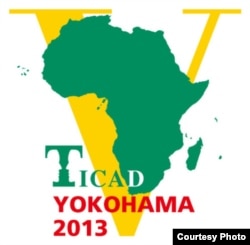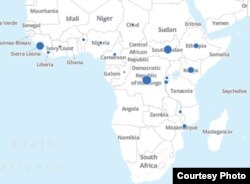WASHINGTON, DC —
In June, Japan made a five-year commitment of $32 billion dollars in public and private funding to Africa. It will be used in areas prioritized as necessary for growth by the Fifth Tokyo International Conference on African Development (or TICAD).
Japan’s new pledge is nearly four times larger than its last commitment to the group.
The plan of action is ambitious.
Japanese funds will help in a number of areas, including trade, infrastructure, private sector development, health and education, good governance and food production
Boosting agricultural production
TICAD wants African agriculture to grow by five percent a year and double the output of one crop that’s also a main food source and cultural symbol for Japan: rice.
Tokyo has years of experience working to improve rice production, not only in Asia but in Africa as well.
It has worked with partners to build new irrigation systems and to improve extension services. In East Africa, Japan helped fund a six million dollar training and research center for rice at Uganda’s National Crop Research Institute. It will help teach farmers about new technologies and production skills.
Japan has also helped create new high yielding hybrids, including the heat- and pest-resistant variety called NERICA, or New Rice for Africa.
Some analysts say improved rice grown in West Africa could eventually find a market in Japan itself. Tokyo is considering joining the new Trans-Pacific Partnership, which would likely require an end to tariffs on rice imports – a move resisted by Japan’s powerful rice lobby.
Shihoko Goto is the northwest Asia associate at the Wilson Center in Washington.
"Growing rice [outside of Japan] that is seen as desirable to the Japanese consumer is always a way for Japan to move forward in meeting its rice consumption needs on the one hand and meeting demands for a level playing field in the agricultural market on the other,' she said.
Emphasis on the agricultural sector does not mean just producing more food, but promoting the empowerment and participation of youth and women in development.
Shigeki Komatsubara is the UNDP’s program advisor for TICAD.
He says Japan and the UNDP worked together with local women in northern Ghana to extract the oil from shea nuts for use in cosmetic products such as soaps and creams. The women were trained to improve processing, and marketing managing revenues in an effort to create demand and widen their customer base. Today, the women’s groups are standing on their own.
"They became fully autonomous," he said. "Now they are not receiving UNDP or Japanese support. Their products are being sold in Accra; their package has been greatly improved, and they now have regular customers willing to import those products to Japan to sell to the Japanese consumer, explaining these made by women’s association in northern Ghana and [the products] are coming from there."
Climate adaption measures
Japan has also worked on programs to involve communities in preparing for natural disasters, which is important in East Asia. Three years ago, Japan was hit by a devastating earthquake, tsunami and subsequent crippling of a nuclear power plant.
In Africa, there are a growing number of emergencies attributed to climate change.
Working with the UNDP’s Africa Adaptation Program, Japan helped 20 African countries better cope with weather-related crises by setting up weather stations across Burkina Faso, strengthening early warning systems in Ghana and establishing a climate change department in the government of Mauritius. Tokyo and the UNDP are also working to improve policies and strengthen institutions that deal with climate and food production.
Shigeki Komatsubara of the UNDP says many measures are simple and inexpensive to implement.
"In northern Ghana, it doesn’t cost much," he said, "and with little investment you can [create storage silos] with raised floors. So if we know [floods] are going to hit soon, people can protect the seeds and agricultural products by moving them in advance rather than waiting till the last minute.
Kaizen
Komatsubara says Japan’s efforts to improve infrastructure, business and economic growth are part of a philosophy taken from the manufacturing sector. It’s called kaizen, and refers to small but steady improvements from the bottom up through the entire workforce.
"The idea," he said, "is to build on small improvements to make the production system or any other system very efficient. It calls for participation of all stakeholders in the area of manufacturing, from production floor to top management, always looking for areas of even small improvements, which add up to big efficiency gains in the end. "
Japanese development experts say as waste is cut and quality increases, productivity – and market shares – expand. One example of kaizen comes from Zambia, where the Japanese International Cooperation Agency (JICA) helped implement a plan to improve tax collection with simple measures, such as creating a friendly atmosphere in the office where the public goes to pay fees.
Ethiopia’s Ministry of Industry and Trade has created a Kaizen Institute to help introduce the ideas to businesses, including a shoe factor in Addis that improved ways to cut leather and a milling company that reduced flour waste by half. Other countries where kaizen projects are underway are Kenya, Ghana, Zambia and Tanzania.
Infrastructure and security
Japanese funding is also used to build roads and other infrastructure.
The country has also helped rehabilitate the city and suburbs of South Sudan’s capital, Juba, including its river port. Japan’s International Cooperation Agency says it also helped fund a 200-meter extension of a pier in Juba harbor. These and other efforts are expected to help promote trade between South Sudan and Sudan once relations improve.
Japan is also involved in enhancing security in Africa, which experts say is necessary for sustainable economic development.
The Japanese government has worked for years to support training of national police forces, including those of the DRC, and UN peacekeeping operations in African countries.
Some are calling for Japan to use its own military in peacekeeping. But analyst Shihoko Goto says it won’t be happening soon. Under its post-World War Two constitution, Japan has a national defense force, but no traditional military.
"Japan needs to go through constitutional reform before it can really expand its military presence overseas. That said, it has been a major provider of peacekeeping operations on a more supportive level in the United Nations," she said.
"Now, I think part and parcel of this latest commitment to Africa is the whole idea of being able to train people on counter-terrorism activities and provide some kind of security. But, it’s going to not be in the form of an obvious Japanese blue beret presence but in more of a supportive- administrative “we’re there, but we don’t actually carry guns” kind of support."
Japan’s $32 billion pledge to Africa comes amid increased competition among East Asia’s industrialized nations for oil, gas, minerals and even food from Africa. For example, Bloomberg News reports that Japan is looking to import rare earth minerals from the continent for high-tech manufacturing.
Two years ago, Chinese-African trade was nearly $140, about five times as much as Japan’s. But Japan says working through the TICAD coalition of Africa and Asian nations will permit Africa to strengthen its economic base and create long-term business partnerships.
And development experts note that TICAD’s approach is much more transparent than China’s. They say public oversight should help ensure that any economic growth resulting from improved trade will benefit the largest number of people possible.
Japan’s new pledge is nearly four times larger than its last commitment to the group.
The plan of action is ambitious.
Japanese funds will help in a number of areas, including trade, infrastructure, private sector development, health and education, good governance and food production
Boosting agricultural production
TICAD wants African agriculture to grow by five percent a year and double the output of one crop that’s also a main food source and cultural symbol for Japan: rice.
Tokyo has years of experience working to improve rice production, not only in Asia but in Africa as well.
It has worked with partners to build new irrigation systems and to improve extension services. In East Africa, Japan helped fund a six million dollar training and research center for rice at Uganda’s National Crop Research Institute. It will help teach farmers about new technologies and production skills.
Japan has also helped create new high yielding hybrids, including the heat- and pest-resistant variety called NERICA, or New Rice for Africa.
Some analysts say improved rice grown in West Africa could eventually find a market in Japan itself. Tokyo is considering joining the new Trans-Pacific Partnership, which would likely require an end to tariffs on rice imports – a move resisted by Japan’s powerful rice lobby.
Shihoko Goto is the northwest Asia associate at the Wilson Center in Washington.
"Growing rice [outside of Japan] that is seen as desirable to the Japanese consumer is always a way for Japan to move forward in meeting its rice consumption needs on the one hand and meeting demands for a level playing field in the agricultural market on the other,' she said.
Emphasis on the agricultural sector does not mean just producing more food, but promoting the empowerment and participation of youth and women in development.
Shigeki Komatsubara is the UNDP’s program advisor for TICAD.
He says Japan and the UNDP worked together with local women in northern Ghana to extract the oil from shea nuts for use in cosmetic products such as soaps and creams. The women were trained to improve processing, and marketing managing revenues in an effort to create demand and widen their customer base. Today, the women’s groups are standing on their own.
"They became fully autonomous," he said. "Now they are not receiving UNDP or Japanese support. Their products are being sold in Accra; their package has been greatly improved, and they now have regular customers willing to import those products to Japan to sell to the Japanese consumer, explaining these made by women’s association in northern Ghana and [the products] are coming from there."
Climate adaption measures
Japan has also worked on programs to involve communities in preparing for natural disasters, which is important in East Asia. Three years ago, Japan was hit by a devastating earthquake, tsunami and subsequent crippling of a nuclear power plant.
In Africa, there are a growing number of emergencies attributed to climate change.
Working with the UNDP’s Africa Adaptation Program, Japan helped 20 African countries better cope with weather-related crises by setting up weather stations across Burkina Faso, strengthening early warning systems in Ghana and establishing a climate change department in the government of Mauritius. Tokyo and the UNDP are also working to improve policies and strengthen institutions that deal with climate and food production.
Shigeki Komatsubara of the UNDP says many measures are simple and inexpensive to implement.
"In northern Ghana, it doesn’t cost much," he said, "and with little investment you can [create storage silos] with raised floors. So if we know [floods] are going to hit soon, people can protect the seeds and agricultural products by moving them in advance rather than waiting till the last minute.
Kaizen
Komatsubara says Japan’s efforts to improve infrastructure, business and economic growth are part of a philosophy taken from the manufacturing sector. It’s called kaizen, and refers to small but steady improvements from the bottom up through the entire workforce.
"The idea," he said, "is to build on small improvements to make the production system or any other system very efficient. It calls for participation of all stakeholders in the area of manufacturing, from production floor to top management, always looking for areas of even small improvements, which add up to big efficiency gains in the end. "
Japanese development experts say as waste is cut and quality increases, productivity – and market shares – expand. One example of kaizen comes from Zambia, where the Japanese International Cooperation Agency (JICA) helped implement a plan to improve tax collection with simple measures, such as creating a friendly atmosphere in the office where the public goes to pay fees.
Ethiopia’s Ministry of Industry and Trade has created a Kaizen Institute to help introduce the ideas to businesses, including a shoe factor in Addis that improved ways to cut leather and a milling company that reduced flour waste by half. Other countries where kaizen projects are underway are Kenya, Ghana, Zambia and Tanzania.
Infrastructure and security
Japanese funding is also used to build roads and other infrastructure.
The country has also helped rehabilitate the city and suburbs of South Sudan’s capital, Juba, including its river port. Japan’s International Cooperation Agency says it also helped fund a 200-meter extension of a pier in Juba harbor. These and other efforts are expected to help promote trade between South Sudan and Sudan once relations improve.
Japan is also involved in enhancing security in Africa, which experts say is necessary for sustainable economic development.
The Japanese government has worked for years to support training of national police forces, including those of the DRC, and UN peacekeeping operations in African countries.
Some are calling for Japan to use its own military in peacekeeping. But analyst Shihoko Goto says it won’t be happening soon. Under its post-World War Two constitution, Japan has a national defense force, but no traditional military.
"Japan needs to go through constitutional reform before it can really expand its military presence overseas. That said, it has been a major provider of peacekeeping operations on a more supportive level in the United Nations," she said.
"Now, I think part and parcel of this latest commitment to Africa is the whole idea of being able to train people on counter-terrorism activities and provide some kind of security. But, it’s going to not be in the form of an obvious Japanese blue beret presence but in more of a supportive- administrative “we’re there, but we don’t actually carry guns” kind of support."
Japan’s $32 billion pledge to Africa comes amid increased competition among East Asia’s industrialized nations for oil, gas, minerals and even food from Africa. For example, Bloomberg News reports that Japan is looking to import rare earth minerals from the continent for high-tech manufacturing.
Two years ago, Chinese-African trade was nearly $140, about five times as much as Japan’s. But Japan says working through the TICAD coalition of Africa and Asian nations will permit Africa to strengthen its economic base and create long-term business partnerships.
And development experts note that TICAD’s approach is much more transparent than China’s. They say public oversight should help ensure that any economic growth resulting from improved trade will benefit the largest number of people possible.



